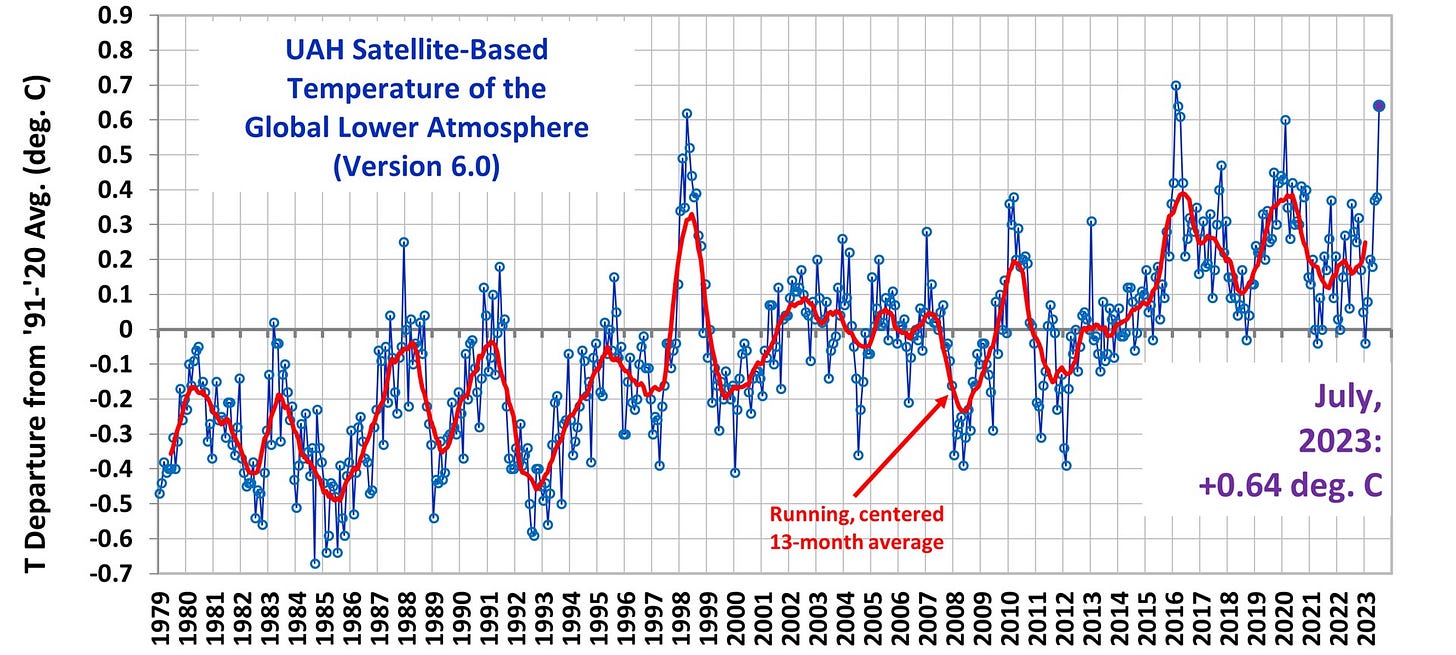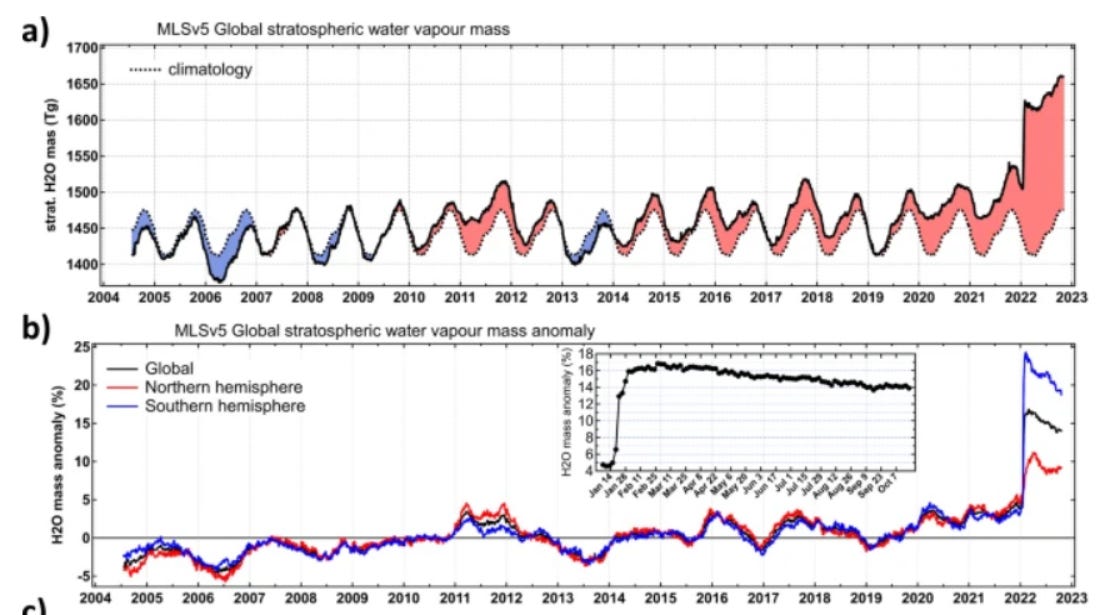Satellite Data Confirms July 2023 Was An Exceptionally Warm Month - Plus More On Why Tonga May Be The Cause
Dr Roy Spencer has updated the UAH lower tropospheric temperature series. The global temperature anomaly shot up to +0.64C in July:
It’s almost as warm as February 2016 and just slightly warmer than April 1998, which marked the global warming peaks associated with two very powerful El Ninos. El Nino has barely got going at the present time so it can’t be that which is causing this spike in global temperature, so what on earth is going on? Dr Roy Spencer says:
New Record High Temperatures and a Weird Month
July 2023 was an unusual month, with sudden warmth and a few record or near-record high temperatures.
Since the satellite record began in 1979, July 2023 was:
warmest July on record (global average)
warmest absolute temperature (since July is climatologically the warmest month)
tied with March 2016 for the 2nd warmest monthly anomaly (departure from normal for any month)
warmest Southern Hemisphere land anomaly
warmest July for tropical land (by a wide margin, +1.03 deg. C vs. +0.44 deg. C in 2017)
These results suggest something peculiar is going on. It’s too early for the developing El Nino in the Pacific to have much effect on the tropospheric temperature record. The Hunga Tonga sub-surface ocean volcano eruption and its “unprecedented” production of extra stratospheric water vapor could be to blame. There might be other record high temperatures regionally in the satellite data, but I don’t have time right now to investigate that.
So I thought I would look in to it further to establish whether this was indeed a possibility and it certainly is.
I went straight to the Nature paper published in December 2022:
Global perturbation of stratospheric water and aerosol burden by Hunga eruption
The eruption of the submarine Hunga volcano in January 2022 was associated with a powerful blast that injected volcanic material to altitudes up to 58 km. From a combination of various types of satellite and ground-based observations supported by transport modeling, we show evidence for an unprecedented increase in the global stratospheric water mass by 13% relative to climatological levels, and a 5-fold increase of stratospheric aerosol load, the highest in the last three decades.
Now, the thing is, the stratospheric water vapour injection was unprecedented in the satellite observation record but the aerosol injection was not. Pinatubo and El Chichon both exceeded Hunga Tonga in terms of the emissions of stratospheric aerosols, which have a cooling effect on global temperature:
In order to place the stratospheric aerosol load perturbation by Hunga into historical perspective, we combined the GloSSAC merged satellite dataset spanning 1979–202049 with the recent aerosol extinction measurements by OMPS-LP and SAGE III satellite sensors. Figure 10c provides evidence that the Hunga eruption led to a 4-5-fold increase in the stratospheric aerosol optical depth (SAOD), exceeding by far any volcanic or wildfire event in the last three decades. With that, the absolute magnitude of SAOD perturbation (embedded panel in Fig. 10c) by Hunga is at least a factor of 6 smaller than that of the previous major eruption of Pinatubo in 1991 and factor of 3 smaller than that of El Chichon in 1982.
So, although the volcanic aerosol injection from Hunga Tonga was very significant, it was not as large as the Pinatubo and El Chichon eruptions. But even so, such a large amount of aerosols should have had a temporary cooling effect from January 2022 when the eruption occurred until round about now, when those aerosols should have decreased to pre-eruption levels, as indicated by the authors of the study:
The stratospheric aerosol perturbation by the Hunga eruption has reached its peak in early June [2022] and exceeded in magnitude the strongest volcanic or wildfire events in the last three decades, including 2009 Sarychev eruption51, 2015 Calbuco eruption33, 2019 Raikoke52 and 2019/2020 Australian Black Summer wildfires46. Since June, the post-Hunga stratospheric optical depth anomaly has been decreasing and, assuming its further exponential decay, the extrapolation projects the return of SAOD anomaly to pre-eruption levels in 14–17 months, that is by mid-2023. We note that the gravitational settling of sulphate aerosols from the stratosphere may be expedited by their fast growth in the humid environment.
Here we are in mid 2023 and the cooling effect of the Hunga Tonga aerosols should at this point have disappeared completely. What cooling effect? A quick look at the UAH satellite data above reveals that there has been no noticeable cooling since January 2022. There is of course another side to this story. Whilst appreciable quantities of cooling aerosols were ejected from Tonga, the event pumped an unprecedentedly huge quantity of water vapour into the stratosphere, which is declining a lot more slowly than the aerosols:
Figure 10b shows that the stratospheric water vapour mass anomaly has reached ~24% in the Southern and ~11% in the Northern hemisphere, whereas the global anomaly has reached ~16% after the eruption. Note that over the 17-yr time span of MLS data, the global and hemispheric anomalies do not exceed 5%, which renders the Hunga-induced perturbation of stratospheric water load unique in the record. Indeed, the Stratospheric Water and OzOne Satellite Homogenized data set (SWOOSH)48 including satellite measurements of stratospheric water vapour since 1985, clearly shows that the perturbation is unprecedented in the satellite record of stratospheric water vapour. The same conclusion is reached by on the basis of GROZCARDS merged satellite data20.
The perturbation of stratospheric water vapour burden by 13% is tremendous and has no frame of comparison in the entire observation record dating back to 1985. As there are no efficient sinks of water vapour in the stratosphere, this perturbation is expected to last over several years. Indeed, in 9 months since the eruption, the water vapour mass anomaly has gradually decreased only by 2.5% (4.3 ± 0.1% annual rate), which should lead to the perturbation timescale of over 3 years, assuming the further linear decay trend. The persistent stratospheric moist anomaly may lead to changes in atmospheric radiative balance;20,24,25,53,54 stratospheric dynamics26 as well as amplification of the polar ozone depletion through wider occurrence of polar stratospheric clouds31.
Given the magnitude, the depth and the expected longevity of the stratospheric perturbation, the Hunga eruption can be said to have initiated a new era in stratospheric gaseous chemistry and particle microphysics with a wide range of potential long-lasting repercussions for the global stratospheric composition and dynamics. It is essential to note that the effect is expected to be much stronger in the Southern stratosphere, which contained the bulk of the eruptive material after 9 months since the event.
So here’s my suggestion: we are beginning to see rapid warming now, in summer 2023, because the radiative warming effect of the water vapour is no longer being cancelled by the aerosol cooling effect of Tonga. It’s as simple as that. On that basis, we can expect further warming over the next year or two and, with the possibility of a moderate El Nino developing in the central Pacific, that will add to the warming by the end of this year and we may be seeing a very significant rise in global temperature which of course the climate propagandists will attribute to anthropogenic greenhouse gases, so be warned; there could be much hysteria ahead, even the global declaration of a ‘climate emergency’.
Another thing to note is that warming is expected to be more intense in the southern hemisphere. At the moment, according to Dr Roy Spencer, there is more warming occurring in the northern hemisphere and the tropics. However, Roy Spencer does note that the southern hemisphere land anomaly is a record and we know that land warms a lot more quickly than ocean (of which there is a lot in the southern hemisphere!). Look at Australasia - a huge anomaly of 1.43, increased from 0.06 in June. This would appear to confirm that the southern hemisphere is starting to respond to the water vapour perturbation from Hunga Tonga. When the oceans respond, it may get very warm indeed.
So in future months we should see an accelerated warming in the southern hemisphere if Tonga is indeed responsible for this spike in global temperature.
Finally, we might expect to see changes in atmospheric circulation. So apart from generalised warming, extreme weather may become slightly more extreme in response to changing jet stream patterns. This has implications for rainfall, hot summers and possible severe winters.
As the atmospheric radiation budget is particularly sensitive to water vapour changes in the upper troposphere and lower stratosphere (e.g. refs. 8,9), even small changes in the stratospheric water content can lead to significant radiative forcing10 and alter stratospheric ozone chemistry11. The increase in stratospheric water vapour concentrations by a few ppmv simulated by current chemistry climate models in response to global warming may cause substantial positive climate feedbacks amplifying surface warming12. A rise in stratospheric water vapour by a few ppmv also induces important changes in atmospheric circulation, increasing the poleward and upward shift of subtropical jet streams and intensifying the stratospheric Brewer-Dobson circulation by about 30%13 with further potential implications for surface climate.
It’s going to be a roller coaster couple of years methinks and the greatest threat we face will not be the weather or climate; it will come from those trying to exploit earth’s weather and climate for political and financial ends.
Update 04/08/2022:
It's just occurred to me that underlying warming from the eruption of Hunga Tonga may have masked more than just cooling due to the emissions of stratospheric sulphate aerosols; it may also have cancelled cooling in 2022 due to the final year of the rare 'triple dip' La Nina. 2022 was in fact the warmest La Nina year ever recorded:
Twin reports released Thursday by NASA and the National Oceanic and Atmospheric Administration found the last nine years were the hottest nine on record, with 2022 being the warmest La Niña year ever recorded.
That’s significant, scientists said, since the La Niña phenomenon typically has a cooling effect on global temperatures.
https://edition.cnn.com/2023/01/12/us/2022-warmest-la-nina-year-climate/index.html
If this is so, then the warming as a result of the Hunga Tonga eruption may be even greater than estimated and now that the aerosols have disappeared AND El Nino is developing in the Pacific, we could be looking at some pretty extreme global warming in the next 6 months to a year. The media is going to go absolutely batshit crazy if so, even more so than they are at the moment.









It's just occurred to me that underlying warming from the eruption of Hunga Tonga may have masked more than cooling due to the emissions of stratospheric sulphate aerosols; it may also have cancelled cooling in 2022 due to the final year of the rare 'triple dip' La Nina. 2022 was in fact the warmest La Nina year ever recorded:
"Twin reports released Thursday by NASA and the National Oceanic and Atmospheric Administration found the last nine years were the hottest nine on record, with 2022 being the warmest La Niña year ever recorded.
That’s significant, scientists said, since the La Niña phenomenon typically has a cooling effect on global temperatures."
https://edition.cnn.com/2023/01/12/us/2022-warmest-la-nina-year-climate/index.html
If this is so, then the warming as a result of the Hunga Tonga eruption may be even greater than estimated and now that the aerosols have disappeared AND El Nino is developing in the Pacific, we could be looking at some pretty extreme global warming in the next 6 months to a year. The media is going to go into hysterics if so, even more so than they are at the moment.
Judging by the fading of my tan gleaned in June, July was a damp squib in the UK, I find it hard to believe we have had the hottest July on record!